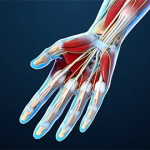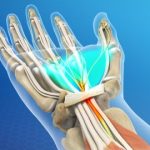



Case:
- A 43 year old builder presented with agonising pain in both wrists and forearms from extensive demolition work of internal walls whilst renovating a house. He had been suffering with the pain for over 6 months and had been surviving on painkillers to get through work.
- The patient had been to his GP to be told that he had been placed on the waiting list to see a consultant with a view to have surgery on both wrists. The builder was reluctant to have the operations as it would mean time off work and loss of income which he couldn’t afford.
- The patient subsequently was more aware of the consequences of using heavy power tools and adjusted the amount of time he spent using them
- The patient’s Carpel Tunnel Syndrome was effectively treated with two osteopathic treatments in successive weeks and the builder returned to work symptom free and hadn’t lost any income
What Is Carpal Tunnel Syndrome?
Carpal Tunnel Syndrome (CTS) is a debilitating condition which causes pain and limits both range of motion and strength in the hands, wrists, fingers, and forearms.
We use our hands day in and day out for many different applications and usages. As a consequence we see a great deal of patients who are experiencing pain in their wrists and have been to their GP to be told that they have Carpel Tunnel Syndrome and will most probably need surgery to rectify the condition and relieve the pain.
The condition is largely related to work in which repetitive hand motions are the norm. Some occupations may increase your risk for carpal tunnel syndrome. Those who type or use hand tools in a repetitive way may be at a higher risk.
This is very often not the case and it can be successfully treated in most cases with simple osteopathic techniques and treatments.
What Causes Carpal Tunnel Syndrome (CTS)?
CTS happens when the carpal tunnel (see below) inside your wrist swells and squeezes 1 of your nerves (median nerve).
You’re more at risk if you:
- are overweight
- are pregnant
- do work or hobbies that mean you repeatedly bend your wrist or grip hard, such as using vibrating tools
- have another illness, such as arthritis or diabetes
- have previously injured your wrist